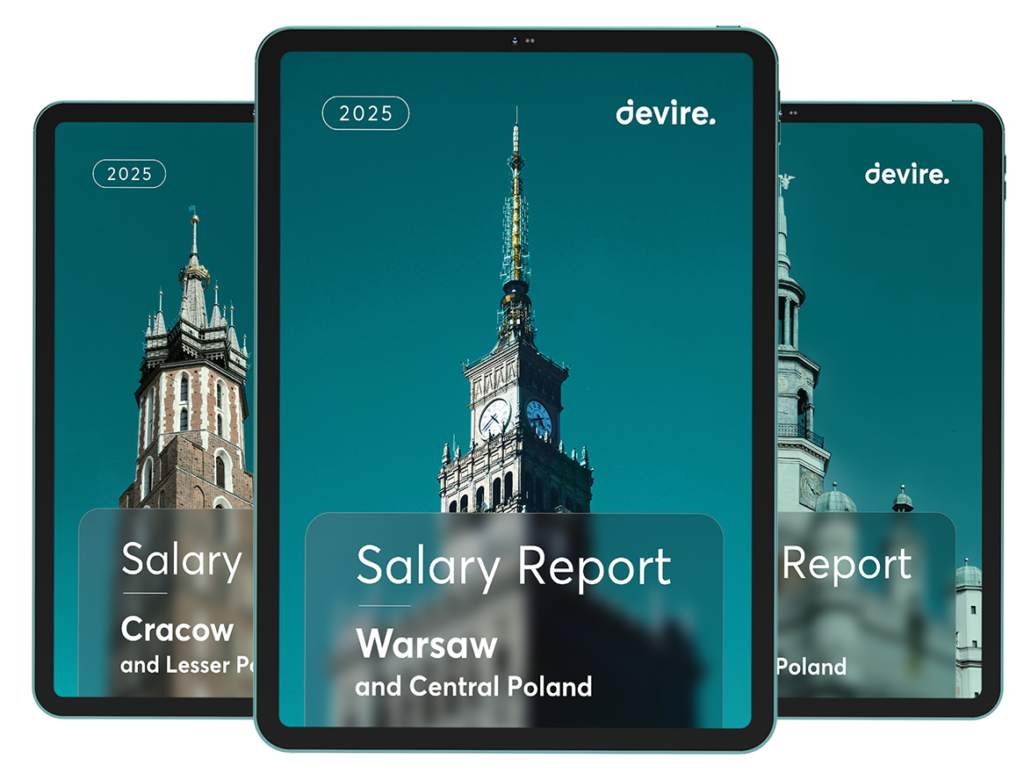The Polish job market is undergoing significant transformation in 2025, shaped by global economic shifts, technological advancements, and regional developments. Whether you are an HR Manager navigating salary negotiations or a business leader planning recruitment strategies in Poland, staying informed about market trends is crucial. Devire’s Salary Report 2025 for Poland offers a comprehensive analysis to guide your decisions. Here’s a preview of the most important trends and challenges shaping the landscape of employment and white-collar wages across Poland.
Poland’s job market reveals notable regional differences, influenced by industry growth, economic conditions, and talent availability. Let’s dive into a few key regions and the opportunities they present.
Northern Poland: Growth Amidst Challenges
The northern region of Poland (Gdansk being the regional capital) continues to garner investor attention, particularly in industries like energy and consumer goods production, underpinned by advancements in infrastructure and digitalization. However, sectors such as automotive and IT face challenges in maintaining workforce stability.
To address skill shortages, companies are prioritizing retention strategies and competitive salary packages. For businesses, this means focusing on flexibility and innovation to attract top-tier talent in a competitive market.
Silesia: Investments Driving Stability
Silesia (with Katowice as a capital) remains a critical economic powerhouse, with new investments in production plants and R&D centers bolstering the region’s stability. The moderate wage growth forecast of around 5% reflects employers’ efforts to meet rising salary expectations while also emphasizing non-wage benefits.
For HR leaders, this is a call to adapt compensation strategies by balancing base salaries with incentives that reflect employee priorities, such as work-life balance and professional development opportunities.
Greater Poland: A Hub of Stability and Technology
Greater Poland maintains one of the lowest unemployment rates in the country (2.9–3%) and boasts robust growth in technological sectors and modern business services. Cities like Poznan are driving this trend through strong infrastructure and a well-educated talent pool. However, rising living costs and inflation pose challenges for employers, demanding strategic caution in new recruitment projects.
To attract and retain employees here, companies must actively address regional concerns by offering inflation-adjusted wages and benefits tailored to the evolving needs of their workforce.
Lesser Poland: Automation and Specialization
As a hub of BPO/SSC and technological innovation, Lesser Poland – with Krakow at its core – illustrates the growing importance of automation and specialized skills in areas like robotics and logistics.
To remain competitive, companies are placing greater emphasis on sustainability (ESG) and innovative benefit structures. If your organization is planning to expand in this region, aligning your recruitment policies with these priorities will be key.
Lower Silesia: Skills Are the New Currency
Lower Silesia, anchored by Wroclaw, is becoming a center for advanced skills in data analytics, AI, and automation. Soft skills like leadership and project management are equally in demand, making this region a magnet for high-caliber talent.
However, with inflationary pressures mounting, businesses must focus on designing creative compensation models that go beyond salaries to include flexible work options and tailored career paths.
Warsaw: Leading the Way in Transformation
As Poland’s capital, Warsaw continues to set trends in technological innovation and business services. In 2025, wage policies are becoming increasingly transparent and equitable, with a clear emphasis on gender equality. Additionally, flexible working models are redefining workplace expectations, particularly among younger professionals.
Organizations in Warsaw must embrace modern compensation practices, which prioritize fairness and development, to remain competitive in this bustling talent market.
Key Takeaways for 2025: A New Era of Employment Practices in Poland
The job market in Poland is on the brink of a new era. From the rise of automation and ESG principles to changing employee expectations, companies must remain agile to thrive in this dynamic environment. Some overarching trends to keep in mind include:
Wage Growth Variability
Salary increases vary by region, with forecasts ranging from 5–6%, reflecting localized economic conditions and sector-specific pressures.
Non-Wage Benefits
Benefits such as flexible hours, remote work options, and professional development programs are becoming standard expectations among top talent.
Regional Differences
Employers must tailor strategies to match regional conditions, ensuring they remain aligned with talent availability, inflation, and cost-of-living dynamics.
Get the Insights You Need with Devire’s Salary Report: Poland 2025
The Salary Report 2025 for Poland is your go-to resource for understanding the complexities of the Polish labor market. With in-depth region-by-region analysis, sector-specific salary benchmarks, and actionable data, this report equips you with the insights needed to:
- Plan competitive salary and benefits packages.
- Strengthen your recruitment strategies to attract top talent.
- Navigate emerging challenges in a rapidly evolving business environment.
Don’t let your business fall behind – check out 2025 salaries in Poland and unlock the knowledge to make informed decisions that support both your organization and its people.
Seeking reliable recruitment company in Poland? At Devire we helped 600+ clients last year to find and recruit more than a 1000 people. Fill out the form, we’ll call you back.



